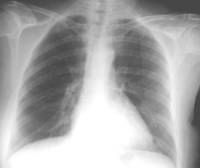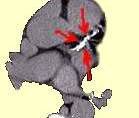27 Reversing Heart Disease without Drugs
 Heart Disease or clogging of the arteries
of the heart is today's number one killer in America and is the reason
why 16 million Americans are taking a Statin anti-cholesterol drug. In
this article we will examine the current knowledge about what causes
heart disease and how to prevent and reverse heart disease without the
use of drugs or surgery.
Heart Disease or clogging of the arteries
of the heart is today's number one killer in America and is the reason
why 16 million Americans are taking a Statin anti-cholesterol drug. In
this article we will examine the current knowledge about what causes
heart disease and how to prevent and reverse heart disease without the
use of drugs or surgery.Is It Cholesterol ?
Most
everyone will tell you that high cholesterol and fat in the diet causes
heart disease, and you will see this type of information prominently
mentioned in newspaper articles and on television. However, if you
actually look at the data, you will find a number of disturbing facts.
Most people who enter the hospital with heart attacks have a normal
cholesterol blood level. Studies of populations of people who eat
mostly animal fat such as the Greenland Eskimos show virtually no heart
disease. Before the 1920's in America, we consumed plentiful amounts of
eggs, butter and lard, yet heart disease was relatively rare at that
time. Only after the 1920's did Heart Disease became an epidemic in the
US. At this time, processed vegetable oils (also called Trans Fats)
and refined sugar products were introduced into the American diet.
Is It the Sugar ?
How can something as American as refined sugar which has nothing to do with fat or cholesterol cause our current epidemic of heart disease? It's not the sugar that is the bad guy because sugar is your brain's primary fuel. It's the high Insulin level that high blood sugar provokes that is the bad guy. The high Insulin leads to Insulin resistance, Obesity and Diabetes, and it activates an important enzyme in the body which turns on a little switch causing chronic inflammation. If the chronic inflammation attacks the lining of the arteries, you get heart disease. If it attacks your joints, you get arthritis.
 Yes,
cholesterol is a major part of the atherosclerotic plaque that clogs
the artery along with calcium. However, cholesterol is not the cause.
It is deposited in the artery wall to repair damage from the
inflammation which is the real cause. Cholesterol is essential for
life. It is an important substance used by the body to make hormones
such as estrogen, and testosterone and it accounts for one half the dry
weight of the brain. Cholesterol is present in all the cell membranes.
What happens when your cholesterol is reduced too low? You get blood
sugar problems, edema, mineral deficiencies, chronic inflammation, and
difficulty in healing, allergies, asthma, reduced libido, infertility
and various reproductive problems.
Yes,
cholesterol is a major part of the atherosclerotic plaque that clogs
the artery along with calcium. However, cholesterol is not the cause.
It is deposited in the artery wall to repair damage from the
inflammation which is the real cause. Cholesterol is essential for
life. It is an important substance used by the body to make hormones
such as estrogen, and testosterone and it accounts for one half the dry
weight of the brain. Cholesterol is present in all the cell membranes.
What happens when your cholesterol is reduced too low? You get blood
sugar problems, edema, mineral deficiencies, chronic inflammation, and
difficulty in healing, allergies, asthma, reduced libido, infertility
and various reproductive problems.
Above Left Image: CAT scan showing calcified coronary artery indicating heart disease .
Statin Drugs ?
Statin
drugs work very well at reducing cholesterol measurements in the
blood. They also are successful at reducing cardiac events such as
heart attacks. However a critical examination of the data on the
numerous medical studies again raises some disturbing questions.
Firstly, none of the Statin Drug studies has ever shown a mortality
benefit for women. Secondly, in the elderly over age 65, lowering the
cholesterol is associated with a higher mortality.
In middle aged men who have
known heart disease, the benefits of a Statin anti-cholesterol drug are
not related to the degree in which they lower the blood cholesterol
level. Instead, the Statin Drug seems to work as a crude
anti-inflammatory drug.
Adverse side effects of the Statin Drugs include muscle damage, nerve damage, and transient global amnesia. These are all related to depletion of an essential vitamin called Coenzyme Q-10 manufactured by the same liver enzyme that also makes cholesterol. So if you are taking a Statin drug and your doctor hasn't recommended that you also supplement with Coenzyme Q-10, please give this article to him or her, as well as an invitation to call me for the references on this subject.
If
you would like to avoid the adverse side effects of drug treatment
listed above, then what can you do to prevent or even reverse heart
disease? I have revealed some of the secrets revealed below:
Diet Lifestyle Modifications to Prevent Heart Disease
1. Low Glycemic Diet.
This is a diet which does not raise your blood sugar and insulin
levels. Consult a Glycemic Index chart and you will be surprised to
discover that certain foods such as bread, potatoes and pasta which
contain dense carbohydrates will raise your blood sugar level the same
at eating pure refined sugar. This is the main cause of our current
epidemic of Obesity and Type Two Diabetes. The Lyon Diet Heart Study
which followed heart attack survivors who ate a low glycemic diet, found
a 70% reduction in fatal heart attacks compared to the high glycemic
group.
2. Omega -3 Fatty Acids in the form of Fish Oil.
The Italian GISSI study showed a 45% reduction in sudden death from
heart attack and 20% reduction in mortality in the group taking fish oil
supplements. This benefit is better than any Statin Drug study. Fish
oils are anti-inflammatory and work better than NSAIDs, which are
over-the-counter non-steroidal anti-inflammatory drugs like Aleve or
Motrin, without their side effects. One problem, though, is that most
fish are contaminated with Mercury and PCBs, so make sure you use a
purified pharmaceutical grade fish oil with all contaminants removed.
The Nutrasource Diagnostics web site lists some fish oils which test out
OK. http://www.nutrasource.ca. Contact me for a list of acceptable brands.
3. Exercise program.
The New USDA Food Guidelines now include exercise steps along the side
of the food pyramid. Exercise reduces chronic inflammation and makes
you feel good. See your doctor for a treadmill EKG test before you
start your exercise program to see if you can tolerate it.
4. Fiber products:
Profibe, a grapefruit fiber product developed by Dr. James Cerda at the
University of Florida was found to reverse atherosclerosis in an animal
model and is available on the internet at www.profibe.com. Anther fiber product is ground flax seeds which I personally take every day.
5. Essential Phospholipids:
This was a patented drug in Europe for many years and many research
studies were completed showing it works very well at reversing heart
disease. This is a nutritional supplement available without a
prescription from Nutrasal called phosphatidyl-choline.
This is also available from Bio-Immune (DetoxMax Plus) and from LipoFlow over the internet. The form which contains EDTA requires a doctors prescription though.
6. Niacin, also
called Nicotinic Acid is one of the B vitamins and the subject of the
Coronary Drug Project (CDP) which was published in the Journal of the
American College of Cardiology in 1986. In the group taking Niacin,
they found a 27% decrease in heart attacks and a 10% reduction in total
deaths. This exceeds any of the Statin Drug studies.
7. Avoid Trans-Fats found in processed vegetable oils and margarine as recommended by the new USDA Food Guidelines. These are toxic to the heart.
8. Have your blood homocysteine level checked. This is a marker for inflammation in the arteries of the heart. If elevated, this can be simply remedied with B vitamins. Everyone over 50 should be taking vitamin-B12 supplements as recommended by your government.
9. Lastly, this may be the most important piece of information on the page: The Unified Theory of Heart Disease,
proposed by Linus Pauling and Mathias Rath suggests that subclinical
vitamin C deficiency (scurvy), Lipoprotein small(a) and mechanical
stress at key arterial sites (such as bifurcations) are the major
players in causation of heart disease. The mechanical damage to the
endothelium causes lysine and proline in collagen to be exposed. Lp(a)
has lysine and proline receptors which allow attachment to the exposed
collagen forming a "patch" over the exposed area.
Drs. Pauling and Rath then obtained a U.S. patent on the use of Vitamin C (6-18 grams/day) and Lysine (6 grams/day) for the prevention and reversal of heart disease. Dr. Rath has added Proline and Coenzyme Q-10 to this formula. In 1992, before his death, Linus Pauling made a video describing this discovery. The real culprit is not cholesterol or the LDL fraction, the real culprit is a "sticky" relative of LDL called lipoprotein(a) or Lp(a). The VAP lipid panel can show your Lp(a) level. Note: LDL combined with apoprotein(a) makes Lp(a).
Advanced Lipoprotein Analysis (VAP by Atherotec) : this test goes
beyond the routine cholesterol panel (HDL, calculated LDL,
triglycerides, and total cholesterol), by providing measurements of HDL,
LDL, and VLDL (very low-density lipoprotein), and also measuring other
important lipoprotein subclasses, including Lp(a), HDL subtypes, and IDL
(intermediate-density lipoprotein). The test also measures LDL pattern
density – important because patients with small, dense LDL (Pattern B) have a four-fold increased risk of developing heart disease. More Info on VAP test.
_______________________________________________
For related content: Heart Prevention Information Pages
_______________________________________________
Recommended Reading :
Lipitor: Thief of Memory, Statin Drugs and the Misguided War on Cholesterol, by Duane Graveline, M.D.(c) 2004
The Cholesterol Myths : Exposing the Fallacy that Saturated Fat and Cholesterol Cause Heart Disease, by Uffe Ravnskov,MD, PhD,
The Heart Revolution : The Extraordinary Discovery That Finally Laid the Cholesterol Myth to Rest by Kilmer McCully, M.D. (c) 2000
Heart Frauds: Uncovering the Biggest Health Scam in History by Charles T. McGee, M.D.
The Myth of Cholesterol: Dispelling the Fear and Creating Real Heart Health - Dugliss Paul, M.D. (c) 2005
The Truth About the Drug Companies: How They Deceive Us and What to Do About It - Marcia Angell, M.D. (c) 2004 Random House
Overdosed America: The Broken Promise Of American Medicine - John Abramson, M.D.(c) 2004 HarperCollins
